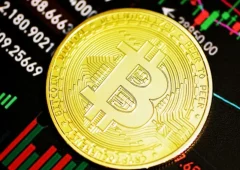Analyst Warns of USDT Delisting in Europe and Growing Regulatory Pressure on Stablecoins
02.03.2025 17:00 1 min. read Alexander Zdravkov
Veteran cryptocurrency analyst, il Capo of Crypto, has shared his latest insights on the evolving crypto landscape, highlighting significant developments in stablecoin trading regulations within Europe.
In his recent update, il Capo warned of an impending delisting of several stablecoins, including Tether (USDT), by cryptocurrency exchange Kraken in the European Economic Area.
This change stems from the implementation of the European Union’s MiCA regulations, which mandates that certain stablecoins, such as EURT, PYUSD, UST, and TUSD, will no longer be available for trading after February 27. From March 31 onwards, any remaining stablecoin holdings will automatically convert to USDC.
While this shift is currently confined to Europe, the analyst suggests that global pressure on stablecoins could intensify in 2025. Il Capo also indicated that Tether, in particular, may face additional challenges as regulatory scrutiny heightens.
Despite this, he considers USDC to be a safer option but has no intentions of holding any stablecoins throughout this year, advising traders to stay vigilant against potential market disruptions.
Additionally, il Capo pointed out a few altcoins that show promise in the short term, including NEAR, DOGE, and ALGO, which have been showing bullish chart patterns recently.
-
1
Here is Why the Fed May Cut Rates Earlier Than Expected, According to Goldman Sachs
08.07.2025 15:00 2 min. read -
2
What Brian Armstrong’s New Stats Reveal About Institutional Crypto Growth
29.06.2025 15:00 2 min. read -
3
Vitalik Buterin Warns Digital ID Projects Could End Pseudonymity
29.06.2025 9:00 2 min. read -
4
Donald Trump Signs “One Big Beautiful Bill”: How It Can Reshape the Crypto Market
05.07.2025 9:56 2 min. read -
5
Market Odds of a U.S. Recession in 2025 Drop in Half Since May
05.07.2025 18:30 2 min. read
Crypto Greed Index Stays Elevated for 9 Days — What it Signals Next?
The crypto market continues to flash bullish signals, with the CMC Fear & Greed Index holding at 67 despite a minor pullback from yesterday.
Banking Trade Groups Urge OCC to Halt Digital Trust Bank Approvals
Five major banking associations are urging the Office of the Comptroller of the Currency (OCC) to delay approval of new national trust bank charters for digital asset firms, including Ripple, Fidelity Digital Assets, National Digital TR CO, and First National Digital Currency Bank.
U.S. Public Pension Giant Boosts Palantir and Strategy Holdings in Q2
According to a report by Barron’s, the Ohio Public Employees Retirement System (OPERS) made notable adjustments to its portfolio in Q2 2025, significantly increasing exposure to Palantir and Strategy while cutting back on Lyft.
Key Crypto Events to Watch in the Next Months
As crypto markets gain momentum heading into the second half of 2025, a series of pivotal regulatory and macroeconomic events are poised to shape sentiment, liquidity, and price action across the space.
-
1
Here is Why the Fed May Cut Rates Earlier Than Expected, According to Goldman Sachs
08.07.2025 15:00 2 min. read -
2
What Brian Armstrong’s New Stats Reveal About Institutional Crypto Growth
29.06.2025 15:00 2 min. read -
3
Vitalik Buterin Warns Digital ID Projects Could End Pseudonymity
29.06.2025 9:00 2 min. read -
4
Donald Trump Signs “One Big Beautiful Bill”: How It Can Reshape the Crypto Market
05.07.2025 9:56 2 min. read -
5
Market Odds of a U.S. Recession in 2025 Drop in Half Since May
05.07.2025 18:30 2 min. read


